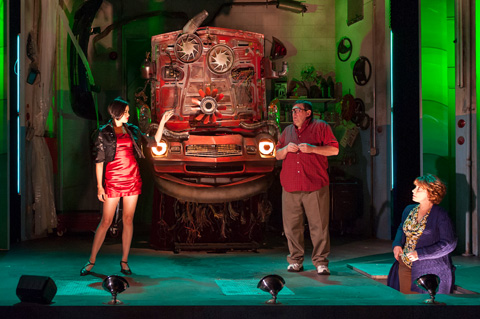
JUNKYARD BLUES The puppet is the best part of Car Talk: The Musical!!!, but it doesn't save this
show from the scrap heap. |
The notion of a musical inspired by Car Talk is bizarre. But Car Talk: The Musical!!!, a co-production of Underground Railway Theater and Suffolk University (at the Central Square Theater through August 12), isn't an adaptation of the long-running National Public Radio show; it's more in the nature of a high-school variety show that uses the voices of Tom and Ray Magliozzi (who recently announced that they will retire after 25 years of doing the radio show) as a touchstone for a rambling plot pumped up with dream ballets that parody songs from well-known musicals (West Side Story, Cats, Annie, My Fair Lady, and others). Almost everything about it — Michael Wartofsky's music, Michelle Chassé's choreography, and especially the book, lyrics, and direction by Wesley Savick — is amateurish and self-indulgent.
The story centers on Rusty Fenders (Scott H. Severance, chewing every piece of scenery that isn't nailed down), a middle-aged, overweight fellow with a bum ticker whose failing car is a metaphor for his stalled life. He has his eye on a sexy sports car, represented by a siren named Miata C. LaChassis (Tiffany Chen), when he should be settling down with his friend and co-worker, Sheila B. Goodfew (Leigh Barrett, way too good for what she's given to do here), who drives a sensible, reliable vehicle. Their boss is a harridan named Beaulah Gasket (Maureen Keiller); I'd swear her first name is a typo, but that's how it appears in the program. The plot is — very roughly — a retrenched version of The Wizard of Oz, with Gasket as the Wicked Witch and the Car Talk duo voicing an outsize puppet called the Wizard of Cahs, who furnishes sardonic, often insulting advice to callers until, for some reason, he goes on strike. As for the dream ballets, they're Rusty's hallucinations when his heart troubles him.
The puppet, designed by David Fichter, is the best thing in the show, though its sources — Audrey II in Little Shop of Horrors and the anthropomorphic cars in the Pixar Cars movies — are transparent. Its lower lip is a bent fender that pulls to the left or the right when it speaks, depending on which of the Magliozzi brothers we're hearing. A few of the props are clever, and scenic designer Susan Zeeman Rogers has done an efficient job of making the stage look like a garage.
The characters' names provide a fair example of the level of wit in the script. (If you don't get "Goodfew," stretch it out to three syllables — as the characters do in the final scene to make sure we don't miss its significance.) The first of the musical-theater spoofs — "I Hope I Get It" from A Chorus Line reimagined as the fervent hopes of car owners that the Wizard doesn't doom their precious autos to the junk heap — is quite a funny idea.